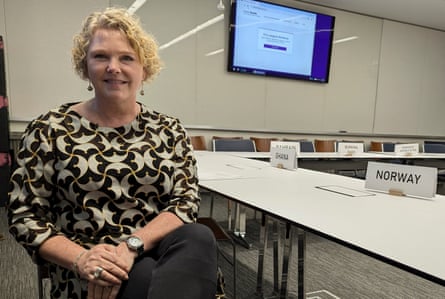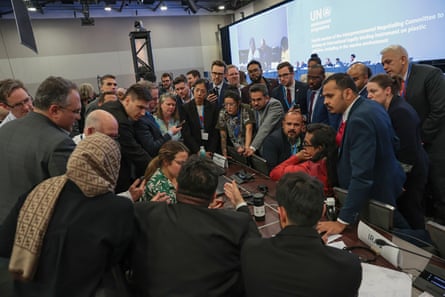The world will be “unable to cope” with the sheer volume of plastic waste a decade from now unless countries agree to curbs on production, the co-chair of a coalition of key countries has warned ahead of crunch talks on curbing global plastic pollution.
Speaking before the final, critical round of UN talks on the first global treaty to end plastic waste, in Busan, South Korea, this week, Norway’s minister for international development, Anne Beathe Tvinnereim, acknowledged the split that had developed between plastic-producing countries and others. She represents more than 60 “high ambition” nations, led by Rwanda and Norway, who want plastic pollution tackled over its full life cycle. Crucially, this means clamping down heavily on production.
While a “perfect treaty” may not be possible due to the strength of opposition, mainly from oil-producing countries, she hoped a deal could be reached that could be strengthened over time.
 View image in fullscreen
View image in fullscreen
“We are not going to land a perfect treaty. But we need to get further. And I think we will. I choose to be hopeful,” Tvinnereim said. “With high-ambition coalition countries, we will continue to demonstrate that there is a big group of countries that sticks to its ambitions. The world desperately needs some leadership now, and some good news.”
This year, various researchers found microplastics in every sample of placenta they tested; in human arteries, where plastics are linked to heart attacks and strokes; in human testes and semen, adding to evidence of the ubiquity of plastics and concern over health risks. The plastics crisis is widely recognised as a threat to human health, biodiversity and the climate.
Two years after a historic agreement by 175 countries to adopt a mandate on negotiations for a global, legally binding treaty to address the whole life cycle of plastics, delegates remain widely divided on what to do – and a deadline is looming. Progress has stalled over a row about the need for cuts to the $712bn plastics industry. The last talks, in April, failed to get an agreement to put production targets – seen as key to curbing plastic waste – at the treaty’s centre.
The final round of talks, which starts on Monday and is due to end on 1 December, is critical.
“We need increased recycling and waste management, of course, but if we don’t reduce production and consumption we will be unable to cope with the volume of plastic in the system 10 years from now,” said Tvinnereim.
Use of plastic could triple globally by 2060, with the largest increases expected in sub-Saharan Africa and Asia. Plastic waste is also projected to triple by 2060, with half ending up in landfill and less than a fifth recycled.
An agreement on a “phase out” of a list of single use plastic products globally, as well as bans on poisonous chemicals in plastic – including for food contact plastic and children’s toys – was a “no-brainer”, said Tvinnereim. Many countries already have unilateral single-use plastics bans.
Fractious negotiations have seen divergent views, and countries with large fossil fuel industries such as Saudi Arabia, Russia and Iran, dubbed the “like-minded” group, have eschewed production cuts and emphasised waste management as the main solution to the crisis. Developing nations, which bear the consequences of plastic overproduction overwhelming their inadequate waste systems, are calling for global cuts.
 View image in fullscreen
View image in fullscreen
The uncertainty dogging the talks has been exacerbated by the US position. One of the largest plastic producers, the US recently signalled it would support a treaty calling for curbs on production. But the impending return of Donald Trump, a fossil fuel advocate, as US president in January, has led to doubts.
The US would be “very welcome” to join the coalition, Tvinnereim said. There was also opportunity for China and others to show leadership.
A negotiator for one of the “high ambition” countries said: “If we can see China stepping up, as we have seen them do elsewhere and domestically, we have a good chance of creating an effective instrument. If we don’t, it is going to be very difficult.”
∎
